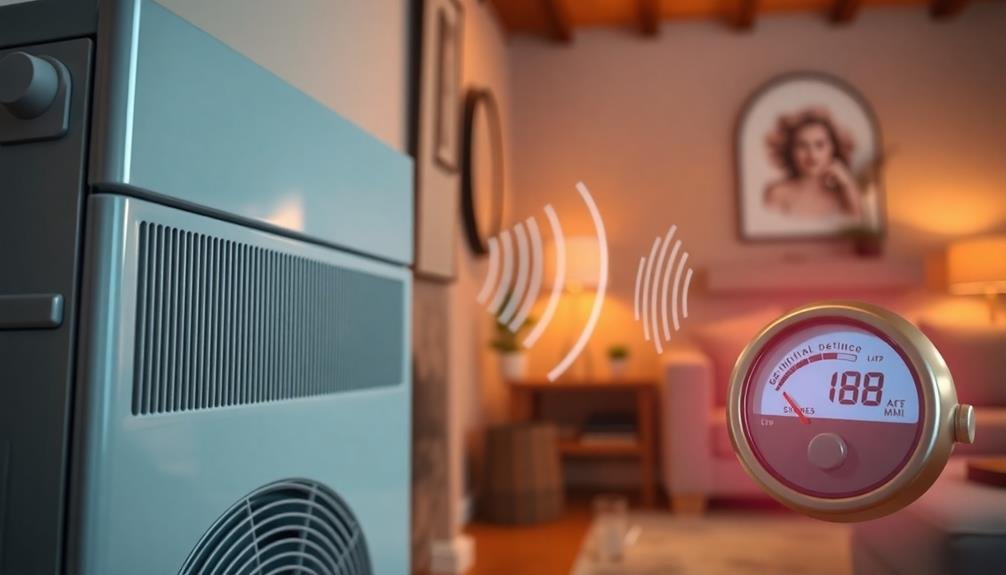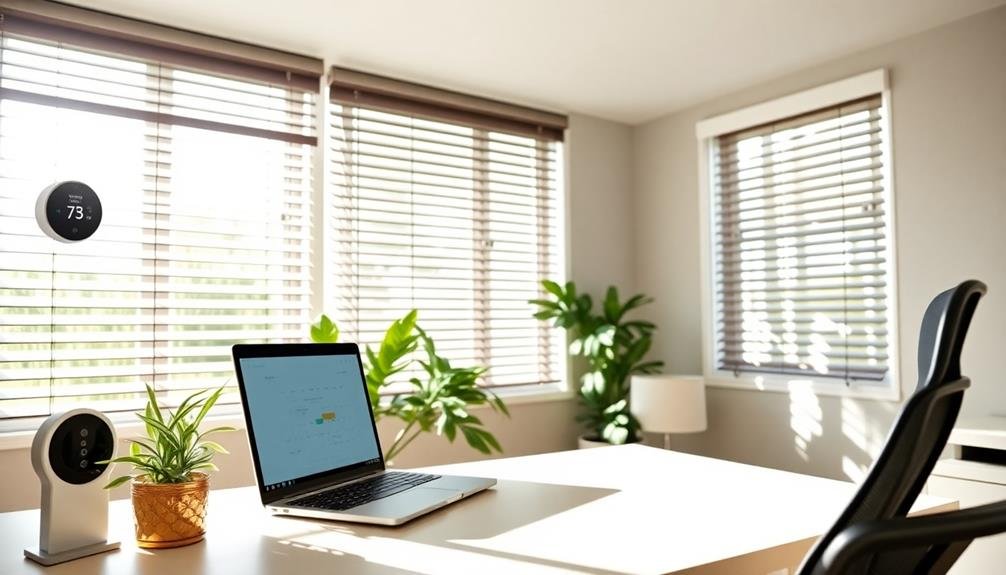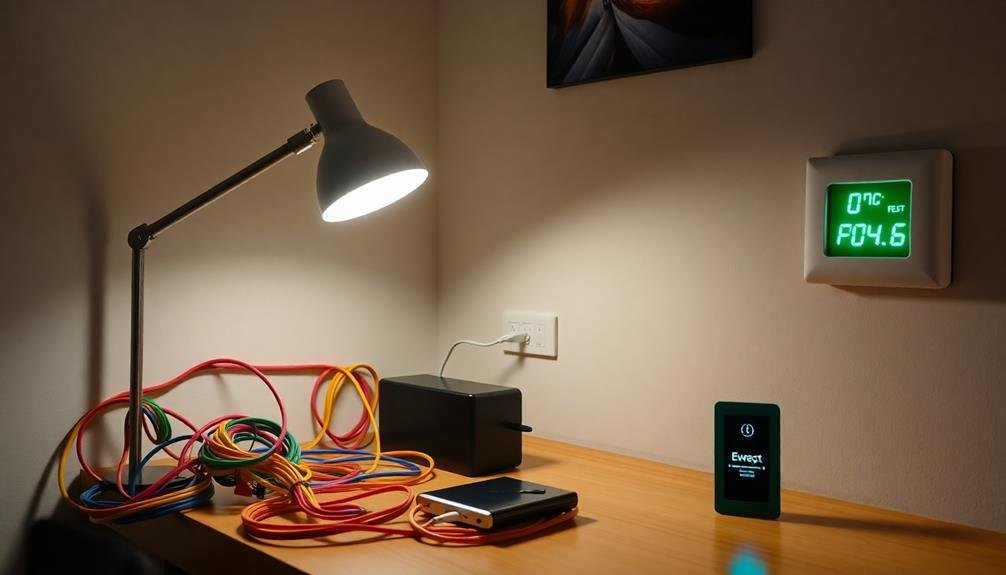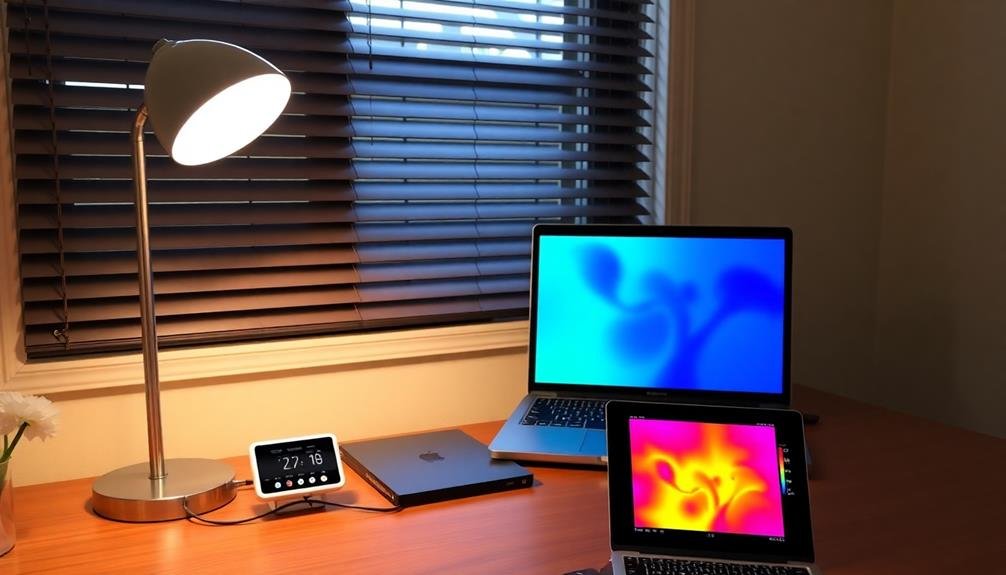Geothermal heat pumps are remarkably quiet, typically operating at 40-60 decibels from 3 feet away—comparable to a soft conversation. You'll likely hear a gentle hum indoors, often barely noticeable. These systems are considerably quieter than traditional HVAC units, which can reach 70-80 decibels. Proper installation and regular maintenance play vital roles in minimizing noise. Factors like equipment quality, home construction, and unit location can affect perceived sound levels. With best practices, your geothermal system should blend seamlessly into your home's background noise. By understanding the factors influencing noise production, you can guarantee a peaceful and efficient heating and cooling experience.
Understanding Geothermal Heat Pump Operation

To grasp the concept of geothermal heat pump noise, it's crucial to understand how these systems operate. Geothermal heat pumps use the earth's constant temperature to heat and cool your home. They consist of three main components: the heat pump unit, the ground loop, and the distribution system.
The heat pump unit is typically installed indoors and contains a compressor, heat exchanger, and circulation pumps. It's responsible for transferring heat between your home and the ground loop.
The ground loop is a network of pipes buried in your yard, filled with a water-antifreeze mixture that circulates through the system. This loop absorbs heat from the ground in winter and releases heat into the ground in summer.
Your home's distribution system, usually ductwork or radiant floor heating, delivers the conditioned air or water throughout your living spaces.
During operation, the heat pump unit cycles on and off to maintain your desired temperature. It's during these cycles that you might hear noise from the system. Understanding these components and their functions will help you identify potential noise sources and determine if they're normal or require attention.
Typical Noise Levels
Most geothermal heat pumps operate at noise levels between 40 and 60 decibels (dB) when measured from a distance of 3 feet. This range is comparable to the sound of a quiet conversation or background music in a restaurant.
You'll find that the noise level can vary depending on factors such as the unit's size, installation quality, and maintenance.
To put these noise levels into perspective, consider the following examples:
- 30 dB: A whisper or quiet library
- 40 dB: A quiet office or living room
- 50 dB: Moderate rainfall or a refrigerator hum
- 60 dB: Normal conversation or an air conditioning unit
You'll notice that geothermal heat pumps are generally quieter than traditional HVAC systems, which often produce noise levels between 70 and 80 dB.
The unit's compressor, which is typically located indoors, contributes to its quieter operation. Additionally, the absence of an outdoor condensing unit further reduces noise pollution in your surroundings.
If you're concerned about noise, you can request sound blankets or noise-reducing enclosures during installation to minimize any potential disturbances.
Indoor vs. Outdoor Noise

Geothermal heat pumps offer distinct noise profiles for indoor and outdoor environments.
Inside your home, you'll typically experience lower noise levels compared to traditional HVAC systems. The indoor unit, usually located in a basement or utility room, produces a gentle hum that's often barely noticeable. You might hear a soft whooshing sound as air moves through the ducts, but it's generally quieter than forced-air systems.
Outdoors, the noise level is even lower. Unlike air-source heat pumps or air conditioners, geothermal systems don't require noisy outdoor compressor units. The only outdoor components are underground pipes, which produce no sound. This makes geothermal heat pumps an excellent choice if you're concerned about outdoor noise pollution or maintaining a peaceful backyard environment.
However, it's essential to recognize that noise levels can vary depending on the specific model, installation quality, and your home's layout. Proper installation and regular maintenance can help minimize any potential noise issues.
If you're sensitive to sound, consider discussing noise reduction options with your installer, such as additional insulation around the indoor unit or vibration-dampening mounts.
Factors Affecting Noise Production
While geothermal heat pumps are generally quieter than traditional HVAC systems, several factors can influence their noise production. The quality of the equipment you choose plays a notable role in determining noise levels. Higher-end models often incorporate advanced sound-dampening technologies, resulting in quieter operation.
The installation process is essential in minimizing noise. Proper insulation, vibration isolation, and correct positioning of the heat pump can greatly reduce sound transmission.
Regular maintenance is also vital to keep noise levels in check. As components wear out or become loose, they may produce more noise, so scheduling routine check-ups can help maintain ideal performance.
Your home's construction and the heat pump's location within it can affect perceived noise levels. Consider these factors:
- Wall thickness and insulation
- Proximity to living spaces
- Flooring materials and structural support
- Ductwork design and sealing
Comparing to Traditional HVAC Systems

You'll find that geothermal heat pumps generally produce lower decibel levels compared to traditional HVAC systems.
When considering indoor noise, geothermal systems typically operate more quietly than conventional air conditioners or furnaces.
Outdoor noise is greatly reduced with geothermal heat pumps, as they don't require noisy external units like traditional air conditioning systems.
Decibel Levels Compared
When comparing noise levels, geothermal heat pumps typically operate at considerably lower decibels than traditional HVAC systems. You'll find that most geothermal units produce sound levels between 42 and 50 decibels, which is comparable to a quiet conversation or the hum of a refrigerator.
In contrast, conventional air conditioners and heat pumps can generate noise ranging from 70 to 80 decibels, similar to the sound of a vacuum cleaner or busy street traffic.
To put these noise levels into perspective, consider the following comparisons:
- Geothermal heat pump (42-50 dB): Whisper-quiet library
- Window air conditioner (60-70 dB): Normal conversation
- Central air conditioner (70-80 dB): Noisy restaurant
- Furnace (80-90 dB): Heavy city traffic
You'll appreciate the quieter operation of geothermal systems, especially if you've experienced the disruptive noise of traditional HVAC units.
The reduced noise is due to the absence of outdoor condensing units and the fact that most system components are housed indoors or underground. This design not only minimizes sound but also protects the equipment from weather-related wear and tear, contributing to its longevity and efficiency.
Indoor Vs Outdoor Noise
The noise profile of geothermal heat pumps differs markedly from traditional HVAC systems, both indoors and outdoors.
Inside your home, you'll notice a significant reduction in noise compared to conventional systems. Geothermal heat pumps operate more quietly because they don't rely on outdoor condensing units, which are often the primary source of noise in traditional HVAC systems.
You'll experience a much quieter indoor environment with a geothermal system. The indoor unit, typically located in a basement or utility room, produces minimal noise during operation. This means you won't hear the loud starting and stopping cycles common with traditional air conditioners or furnaces.
Outdoors, the contrast is even more apparent. While conventional HVAC systems have noisy outdoor units that can disturb your peace and potentially bother neighbors, geothermal systems are virtually silent outside.
There's no outdoor condensing unit, so you won't hear any fan noise or compressor sounds in your yard. This allows you to enjoy your outdoor spaces without the constant hum of HVAC equipment.
You'll also avoid potential conflicts with neighbors over noise pollution, making geothermal systems an excellent choice for densely populated areas or noise-sensitive environments.
Noise Reduction Techniques
To minimize geothermal heat pump noise, you'll want to focus on key reduction techniques.
Start by soundproofing the mechanical room where your system is housed.
Next, implement vibration isolation methods to prevent noise transmission through the structure.
Soundproofing Mechanical Room
Effectively soundproofing the mechanical room is often an essential step in minimizing geothermal heat pump noise. You'll want to focus on creating a barrier between the noise source and the rest of your living space.
Start by evaluating the room's current sound transmission and identifying weak points.
To soundproof your mechanical room, consider these key strategies:
- Install mass-loaded vinyl on walls and ceiling to absorb sound waves.
- Use acoustic foam panels to reduce echo and reverberation.
- Seal gaps around doors, windows, and pipe penetrations with acoustic caulk.
- Add a solid-core door with weatherstripping to block noise transmission.
Don't forget about the floor, as vibrations can travel through it.
Consider installing a floating floor or using rubber mats under equipment. If possible, place the heat pump on vibration-isolating mounts to reduce structural transmission of noise.
Vibration Isolation Methods
While soundproofing the mechanical room is essential, implementing effective vibration isolation methods can greatly reduce noise at its source. You'll find that these techniques prevent vibrations from traveling through the building structure, minimizing the noise you hear in living spaces.
Start by installing vibration isolators under your geothermal heat pump. These rubber or spring-based mounts absorb vibrations before they reach the floor. Next, use flexible connectors for ductwork and piping to prevent vibrations from transferring through these systems.
Consider these popular vibration isolation methods:
| Method | Effectiveness | Cost |
|---|---|---|
| Rubber Mounts | Good | Low |
| Spring Isolators | Excellent | Medium |
| Inertia Bases | Very Good | High |
| Floating Floors | Excellent | High |
For maximum noise reduction, combine multiple methods. Install your heat pump on spring isolators atop an inertia base, which adds mass to dampen vibrations. Use rubber gaskets between pipes and wall penetrations to further minimize vibration transfer.
Proper System Maintenance
With proper maintenance, you can considerably reduce noise from your geothermal heat pump system. Regular upkeep not only guarantees peak performance but also minimizes unwanted sounds.
To keep your system running quietly, focus on these key maintenance tasks:
- Clean or replace air filters monthly
- Inspect and clean coils annually
- Check and tighten all electrical connections
- Lubricate moving parts as recommended by the manufacturer
Don't overlook the importance of scheduling professional maintenance at least once a year. A trained technician can identify and address potential noise sources before they become problematic.
They'll inspect components like the compressor, fan motor, and ductwork for signs of wear or damage that could lead to increased noise levels.
Pay attention to any changes in your system's sound. If you notice new or louder noises, don't ignore them.
Promptly addressing these issues can prevent more serious problems and costlier repairs down the line. By staying proactive with your geothermal heat pump maintenance, you'll enjoy a quieter, more efficient system for years to come.
Installation Best Practices

Proper installation techniques are essential for minimizing geothermal heat pump noise. When installing your geothermal heat pump, make certain that it's placed on a solid, level surface to reduce vibrations. Use vibration isolation pads or springs between the unit and the floor to further dampen any potential noise. Install flexible connectors on refrigerant lines and ductwork to prevent vibrations from traveling through your home's structure.
Choose an appropriate location for the heat pump, away from bedrooms and living areas if possible. Consider installing it in a basement or dedicated mechanical room with sound-absorbing materials on the walls and ceiling. Properly size your system to avoid short cycling, which can increase noise levels. Work with a certified geothermal installer who understands local building codes and best practices for noise reduction.
Make certain that all ductwork is properly sealed and insulated to prevent air leaks and reduce noise transmission. Use larger diameter ducts with gradual turns to minimize air turbulence and associated noise. Install sound attenuators in the ductwork if necessary.
Maintenance for Quieter Operation
In accordance with maintaining ideal performance, regular maintenance of your geothermal heat pump is essential for quieter operation. By following a routine maintenance schedule, you'll guarantee your system runs smoothly and quietly for years to come. Regular inspections and cleaning can prevent issues that lead to increased noise levels.
To keep your geothermal heat pump operating quietly, focus on these key maintenance tasks:
- Clean or replace air filters monthly to prevent airflow restrictions and reduce strain on the system.
- Check and clean the condensate drain line annually to avoid clogs that can cause water buildup and gurgling noises.
- Inspect and tighten any loose components, such as fan blades or mounting brackets, which can create vibrations and rattling sounds.
- Schedule professional maintenance annually to address potential issues before they become noisy problems.
Don't forget to keep the area around your indoor unit clear of debris and objects that could obstruct airflow.
If you notice any unusual noises, address them promptly to prevent further damage and maintain quiet operation.
Addressing Common Noise Complaints

Understanding the root causes of noise complaints is essential for maintaining a peaceful geothermal heat pump system. Common complaints often stem from vibrations, refrigerant flow, or compressor issues.
To address these, first identify the specific type of noise you're hearing.
If you're experiencing a low humming or vibrating sound, check for loose components or inadequate insulation. Tightening connections and adding vibration-dampening materials can often resolve these issues.
For whistling or hissing noises, which may indicate refrigerant leaks, contact a professional immediately to prevent system damage and guarantee safety.
Loud clicking or banging sounds could signal problems with the compressor or starting capacitor. In these cases, you'll need a technician to diagnose and repair the issue.
If you notice a sudden increase in overall system noise, it might be due to worn bearings or fan blades, which require prompt replacement.
Regulations and Noise Standards
Regulations and noise standards for geothermal heat pumps vary widely depending on your location and the specific installation. You'll need to check with your local authorities to determine the exact requirements for your area. Generally, these standards aim to maintain a comfortable living environment for both you and your neighbors.
Many jurisdictions use decibel (dB) levels to measure and regulate noise. For geothermal heat pumps, you'll typically encounter the following standards:
- Residential daytime limits: Often set between 50-60 dB
- Residential nighttime limits: Usually lower, around 40-50 dB
- Commercial area limits: May be higher, sometimes up to 65-70 dB
- Industrial zone limits: Can exceed 70 dB in some cases
You're responsible for ensuring your geothermal heat pump complies with these regulations. If you're planning an installation, work with your contractor to select equipment that meets local standards.
They can help you choose quieter models or implement noise reduction strategies if needed. Remember, violating noise regulations can result in fines or require costly modifications to your system, so it's best to address potential issues during the planning stage.
Frequently Asked Questions
Can Geothermal Heat Pumps Affect Nearby Wildlife or Ecosystems?
You'll find that geothermal heat pumps generally have minimal impact on wildlife or ecosystems. They're mostly underground, so they don't disrupt habitats. However, you should consider potential effects during installation, especially in sensitive areas.
Do Geothermal Heat Pumps Work Effectively in All Climate Zones?
You'll find geothermal heat pumps work well in most climates. They're highly efficient in moderate zones, but can struggle in extreme cold. However, with proper sizing and installation, they'll provide effective heating and cooling nearly anywhere.
How Long Does a Typical Geothermal Heat Pump System Last?
You can expect your geothermal heat pump system to last 20-25 years on average. The indoor components typically have a lifespan of 25 years, while the ground loop can function for 50+ years with proper maintenance.
Are There Any Health Risks Associated With Geothermal Heat Pump Noise?
You shouldn't worry about health risks from geothermal heat pump noise. These systems are generally quiet, and the low-level sounds they produce aren't known to cause any health issues. You'll likely forget it's even there.
Can Geothermal Heat Pumps Be Used for Both Residential and Commercial Buildings?
Yes, you can use geothermal heat pumps for both residential and commercial buildings. They're versatile systems that efficiently heat and cool various structures. You'll find them in homes, offices, schools, and even large industrial facilities, providing year-round comfort.
In Summary
You've now got a thorough understanding of geothermal heat pump noise. Remember, these systems are typically quieter than traditional HVAC options. Pay attention to proper installation and regular maintenance to minimize noise. If you're concerned about sound levels, consult with a professional to guarantee your system meets local regulations. With the right approach, you'll enjoy efficient heating and cooling without disruptive noise. Don't hesitate to address any persistent issues promptly for peak performance and comfort.





Leave a Reply